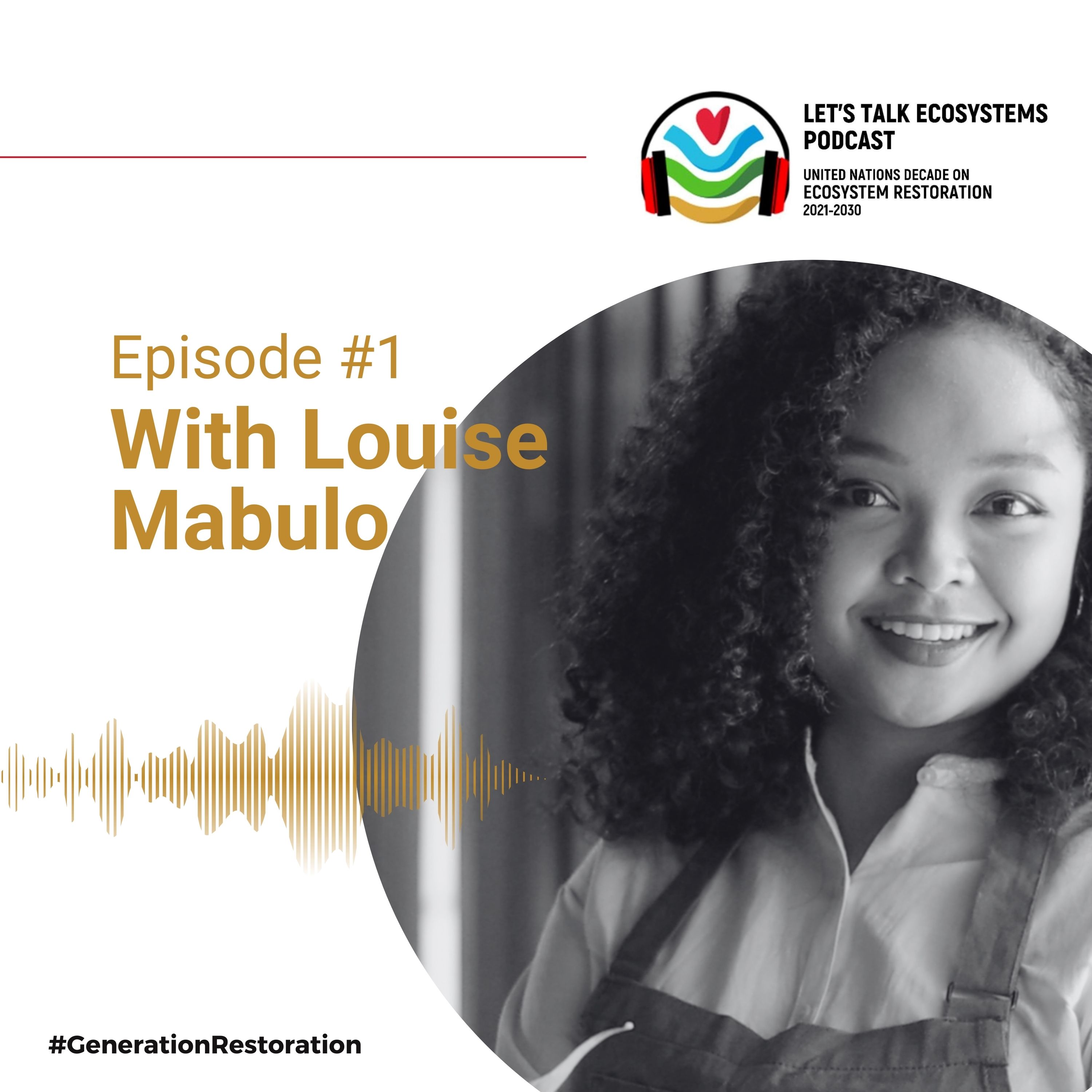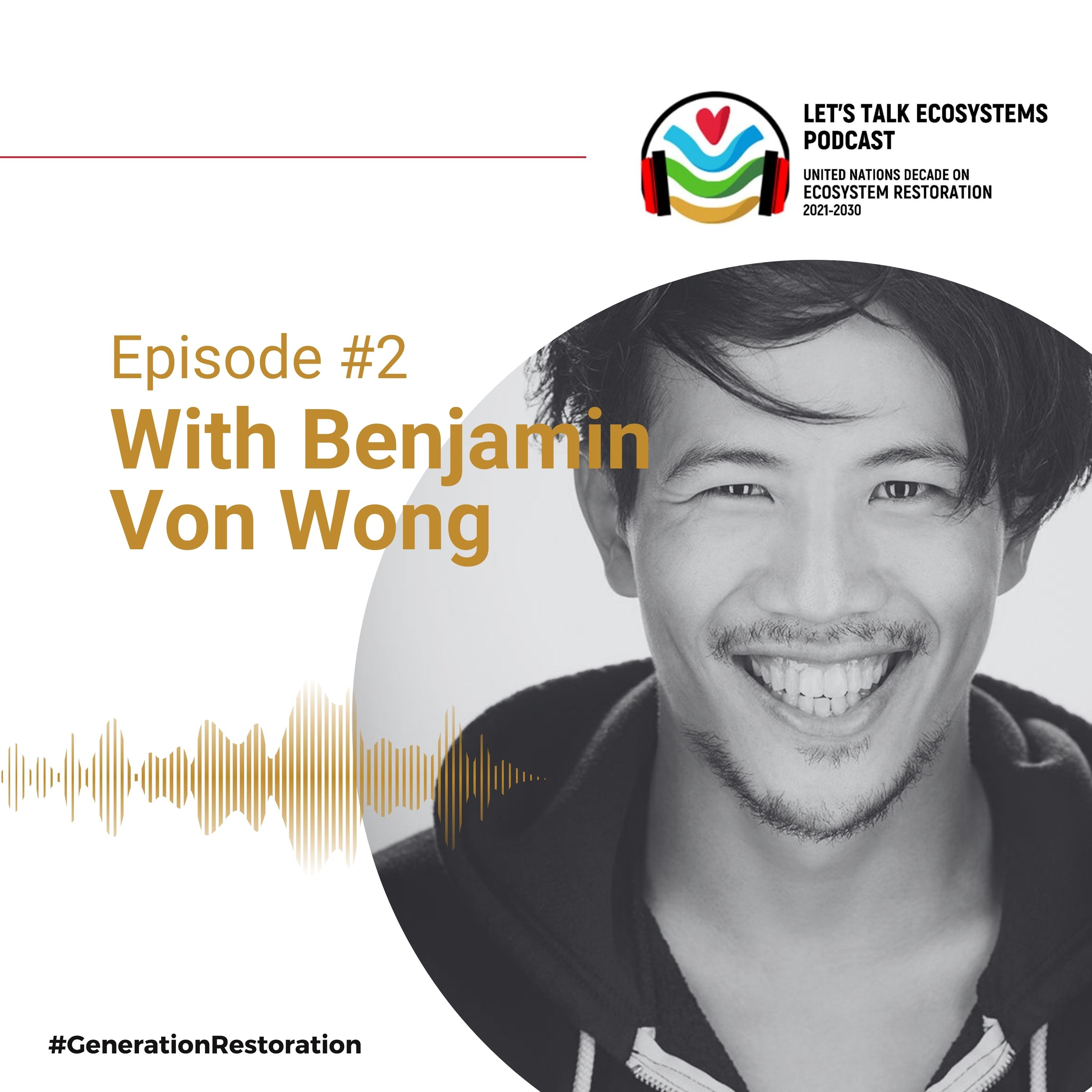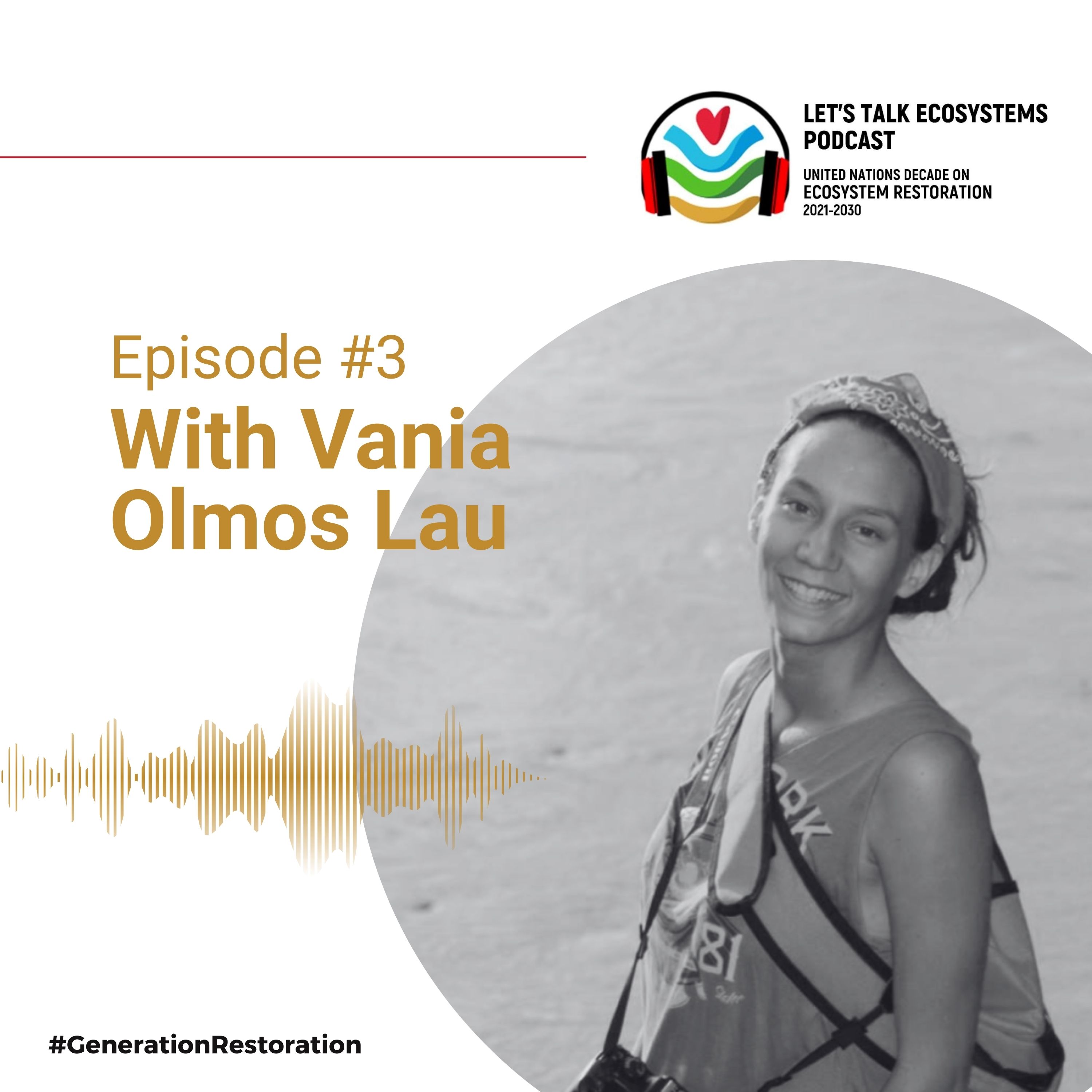"Let's Talk Ecosystems" Podcast
Discussion details

Produced within the framework of the UN Decade on Ecosystem Restoration, the "Let's Talk Ecosystems" podcast comprises a comprehensive 10-episode audio series, featuring interviews conducted by the United Nations Environment Programme (UNEP) and the Food and Agriculture Organization of the United Nations (FAO) with young environmentalists who are making a positive change for our planet. This podcast aims to give the floor to these passionate people who are doing great things all around the world, so they can share their experiences and inspire others.

Episode 1 "Who doesn’t love chocolate?"
The first episode features Louise Mabulo, a Filipino environmentalist, farmer, social entrepreneur, and master chef. Louise is the founder of The Cacao Project, a social enterprise that works with over 200 farmers in the Philippines. She shares her thoughts on farming as a career choice, an opportunity to provide green jobs and landscape stewardship. She’s also a chocolate expert, explaining what fair trade means to the industry and how cacao farming can happen sustainably. Louise talks about the power of food and recipes, how cooking can galvanize entire populations, promoting the farm-to-table narrative. In addition, Louise advises how young people can get involved in ecosystem inclusive spaces.
Listen to the full episode here

Episode 2 "Do you know how art can closely be linked to the environment and education?"
The second episode features Benjamin Von Wong from Canada, an artist at heart, who describes himself as: “an Artist focused on amplifying positive impact”. Benjamin openly shares his passion for art, nature, and environmental activism. He talks about his life, passions, inspirations and way of working. Benjamin is an internationally recognized artist who, through his art, raises awareness about the environmental challenges our Earth is facing. Together with communities where he works, he reuses materials destined for the trash to create his impressive and eloquent installations. His aim is to jumpstart the urgent action needed for our planet.
Listen to the full episode here

Episode 3 "Kick-starting an environmental youth group"
The third episode features Vania Olmos Lau, a Mexican biologist who specializes in setting up and kick-starting environmental youth groups. Vania has a knack for conceptualizing and setting up youth-based groups, from the highly successful Restoration Stewards to the Network of Young Environmentalists in Mexico. She has also been involved with establishing the Latin American branches for Youth 4 Nature and the Major Group for Children and Youth. Listen to the tips from Vania on how to set up an environmental youth group, while building a sustainable movement with maximum impact.
Listen to the full episode here

Episode 4 "Growing coral to revitalize reefs"
In the episode 4, the podcast takes a deep dive into the marine world of Gator Halpern from The Bahamas. Gator is the co-founder and President of Coral Vita, a company based in the Bahamas that grows corals to revitalize dying reefs. Coastal and reef ecosystems sustain life both above and below the ocean, providing critical habitat for marine life, but also livelihoods for coastal communities. But climate change and human activities pose an existential threat to these ecosystems and the life they support.
Listen to the full episode here

Episode 5 "Who Wants to Live in Greener Cities?"
In the episode 5, meet with Liliana Jaramillo Pazmiño from Ecuador, a young native plants lover whose goal is to make a greener Quito, the capital, while contemplating sustainable and educational actions. This episode is about the important topic of greening cities. Liliana is a biologist with a Master’s degree in environmental studies from the University of Melbourne. Since she is not only a dreamer, she has decided to take action and has founded Nativus for the conservation of native species in cities. She is now a major player in rehabilitating neglected urban spaces into green parks and in greening roofs in the city of Quito. She is also an activist working together with communities for environmental education and inclusive actions. Liliana brings nature into the city while considering the needs of everyone. As a biodiversity lover, she has also built her own native plants nursery.
Listen to the full episode here

Episode 6 "The Agriculture that Mimics Nature"
This episode features Felipe Villela from Brazil. He is the co-founder of reNature, an organization based in the Netherlands that works worldwide with farmers and corporations to support the transition toward regenerative agriculture. Considering that 95% of our food starts in soils, regenerating and restoring degraded lands is critical for food security. Felipe brings working solutions to the table on how communities and businesses can regenerate and restore the land following nature’s example.
Listen to the full episode here

Episode 7 "The Amazon Rainforest Guardians"
In this episode, meet Natalie Knowles, a Canadian conservationist and explorer focused on social, economic, and environmental sustainability in adventure travel and outdoor recreation. Natalie was awarded the 2020 Adventure Travel Conservation Fund and Explorer's Club Rolex grants for her work with the Kayapo developing conservation-based and indigenous-led adventure tourism in Brazil's Xingu River basin. In this episode, Natalie shares her thoughts on the essential role of indigenous people in conserving biodiversity, as they are very intimately related to the environment in which they are living. She explains not only the fascinating stories of the Kayapo Indigenous people but also all the challenges these people and the Kayapo Project are facing in preserving the Amazon forest, lungs of the planet.
Listen to the full episode here

Episode 8 "Saving the Congo Rainforest and its Indigenous Communities"
Remy Zahiga, from the Democratic Republic of the Congo, is a young climate activist who has made it his life mission to save the Congo Basin Rainforest. To do this, he’s been planting trees in areas that have been damaged by mining activities, while also lobbying authorities to prioritize the saving of the rainforest. The Congo Rainforest is the second largest tropical rainforest in the world, covering an area of 2 million square kilometers, and is also one of the most biodiverse areas on Earth, supporting hundreds of species of trees and an estimated 10,000 species of animals. In addition, an estimated 75 million people (including approximately 150 ethnic groups) live in this forest and depend on it for their livelihoods. In this episode, Remy shares why he wants local communities, young people and governments to help him save this vital region.
Listen to the full episode here

Episode 9 "Mediterranean - style for plastic fishing"
This episode features Lefteris Arapakis from Greece. He is the founder of Enaleia, a non-profit social enterprise tackling plastic sea pollution by promoting fishing practices that preserve local fish populations and remove the mounds of plastic that pollute the world’s seas, adapting the fishing industry for a greener future. Enaleia’s mission is to make the marine ecosystem sustainable by tackling both overfishing and plastic pollution. We discover how a small idea has blossomed into a multi-national effort to find solutions to rid our oceans of plastic debris.
Listen to the full episode here

Episode 10 "How we Can Restore our Natural Environment?"
In this episode, meet two great actors who are working for the UN Decade on Ecosystem Restoration, not only behind the scenes: Ann-Kathrin Neureuther from UNEP, communications manager on the UN Decade and James Obata from FAO, focal point for communications surrounding the UN Decade. In this episode, you will find out why we need to restore nature, bring it back into our lives, and protect our remaining ecosystems. You will hear what we can do in our daily life to take action, since we are the last generation that can make peace with nature. Now is the time to act, with many activities and challenges to be implemented by all of us. We are running out of time to save our ecosystems and biodiversity, an urgency which defines the 2021-2030 timeframe of the UN Decade.
Listen to the full episode here
Join #GenerationRestoration

Log in with your EU Login account to post or comment on the platform.